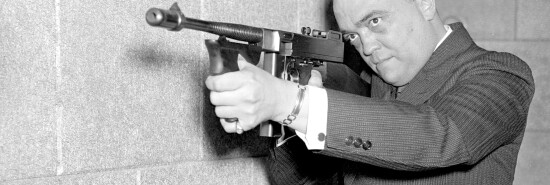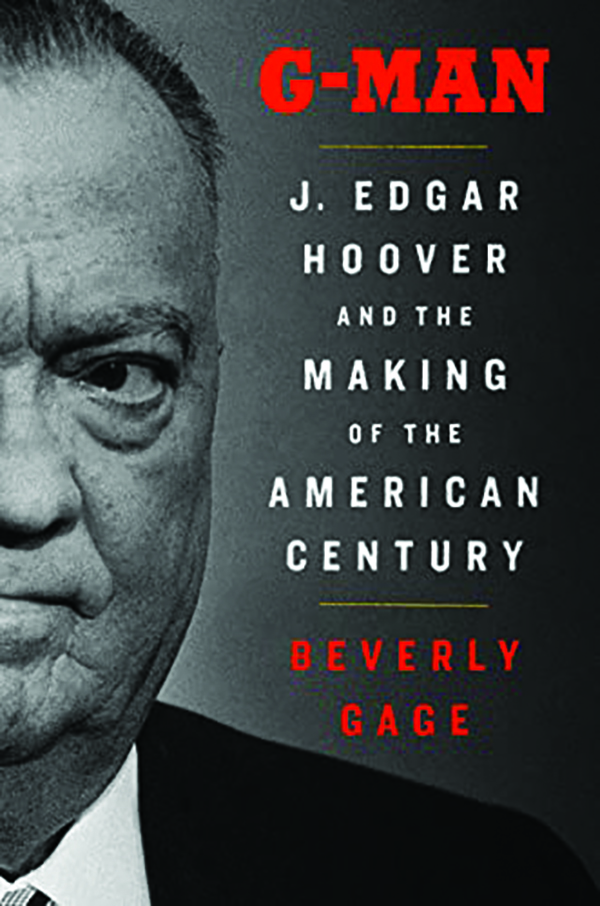
The man who built the FBI
Sean Durns
A stolid career bureaucrat who at first glance lacked a political constituency, J. Edgar Hoover is one of the most important and unlikely figures in modern America. When he died in 1972 at the age of 77, the Christian Science Monitor opined: “There probably will never be anybody like Mr. Hoover again.” “Nor should there be,” the writer concluded. In her new biography, G-Man: J. Edgar Hoover and the American Century, Yale historian Beverly Gage tells us why.
Hoover served 48 years as the FBI’s head, amassing power and influence that coincided with the rise of America on the world stage. A native of Washington, D.C., Hoover joined the Department of Justice in 1917 during World War I. By 1921, he was appointed assistant director of what was then merely called the Bureau of Investigation. Three years later, at the mere age of 29, he was appointed director of what would, a decade later, be renamed the Federal Bureau of Investigation.
Hoover’s nearly half-century tenure running the FBI spanned eight presidencies and a sea change in American life. When Hoover took over, it was a small agency with little recognition. Bureau agents weren’t even issued firearms and had limited jurisdiction. By the time he died, the FBI was an internationally regarded law enforcement agency, with capabilities and reach that spanned the globe. And he was never free from controversy. Although he often enjoyed a solid plurality in poll numbers while he was alive, in death, Hollywood and popular culture have often portrayed him as a Machiavellian character, deeply corrupt and prone to abusing his office while constantly seeking the limelight.

The Hoover that emerges in Gage’s portrait is both more complicated and more human. To her credit, Gage largely avoids judging Hoover, preferring to lay out the facts and let readers decide for themselves. Hoover, she writes, “was more than a one-dimensional tyrant and backroom schemer who strong-armed the country into submission.” Indeed, “he was the most influential federal appointee of the twentieth century.”
Gage handles Hoover’s personal life, long the subject of rumors and innuendo, with commendable tact, careful not to assume what the evidence doesn’t suggest. She relates, for example, the infamous story of Hoover dressing in drag and partaking in orgies but also notes that the source for that story was later convicted of perjury. But the official is more important than the citizen. The most interesting aspect of G-Man is its exploration of how Hoover used power. The J. Edgar Hoover that Gage fleshes out is a canny bureaucratic operator with keen political instincts. Hoover was adept at fighting turf wars and preserving, and often expanding, what he felt were his prerogatives. It is no accident that he thrived in D.C. for so long.
Hoover came of age during the Progressive Era and, as Gage convincingly argues, embodied its many beliefs and contradictions. Hoover “believed in the power of the federal government to do great things and fight great battles on behalf of the nation’s citizens.” His career, Gage writes, reflected a “faith in progressive, expert-driven government.” This is a point seldom made about Hoover, but Gage ably makes her case.
Hoover sought to modernize law enforcement. And to a very large extent, he succeeded. He championed expansive databases and records maintenance. He wanted both the public and policymakers to view his bureau as a science-driven agency that eschewed some of the darker, more backward aspects of law enforcement. It was a carefully crafted image, and one that Hoover sincerely believed in.
Like Woodrow Wilson and other early 20th-century progressives, Hoover’s views on the expansive power of government existed alongside his social conservatism and not-so-thinly veiled racism. Hoover grew up in a segregated Washington, D.C., and was very much the product of his time and background. Despite his public emphasis on professionalization, he cultivated proteges, often marking certain people for rapid ascent. Hoover’s “G-Men” were expected to adhere to his idiosyncrasies: formal attire, meticulous grooming standards, and the ability to pack up and move at a moment’s notice. Under Hoover, being a fellow George Washington University alum went far in advancing one’s FBI career. And so did being white and an avid churchgoer. He was a lifelong supporter of his college fraternity, Kappa Alpha, which worshiped the Confederacy and preached its “Lost Cause” mythology.
Hoover’s racism and his innate caution helped fuel a reluctance to tackle civil rights cases. Nonetheless, Hoover’s FBI employed a wide range of methods, many of questionable legality, to attack the Klan. The Bureau’s campaign, while secret during his lifetime, was largely a success. But Hoover also viewed the KKK and civil rights activists as equally problematic. Both, he believed, constituted a threat to the status quo. That one was a violent, hate-fueled terrorist group and the other seeking justice and their God-given, constitutional rights was a distinction that he couldn’t recognize.
Hoover’s beliefs would lead him to both investigate and harass Martin Luther King Jr. and other civil rights leaders, as the director and his top aides expressed concerns about a “Black Messiah” during the 1960s. By that point, Gage notes, Hoover’s carefully honed political instincts had begun to abandon him, with much of his worldview belonging to an age that was rapidly receding. Had Hoover decided to step down in 1959, Gage speculates, “we might remember him differently, as a popular and well-respected government official.” Instead, he stayed on, and his “abuses and excesses,” she warns, “offer a troubling case study in unaccountable government power.” By the time he died in 1972, Hoover’s carefully crafted image of apolitical professionalism was coming undone.
Hoover’s lifelong obsession with the dangers posed by communism enabled the FBI to achieve remarkable success in counterintelligence, helping to level the U.S. Communist Party and many of its fellow travelers. But his racism and “ends justify the means” approach ended up tainting both his legacy and the bureau’s. And as Gage makes clear in her well-written and engaging book, it was, in some respects, a collective failure. “Hoover,” she writes, “always insisted that his creation was thoroughly American.”
Sean Durns is a Washington, D.C.-based foreign affairs analyst.
